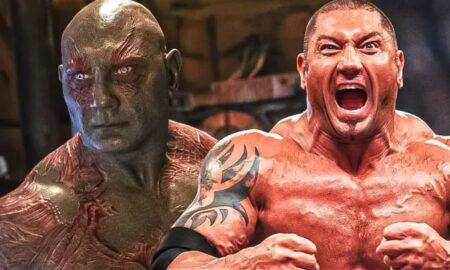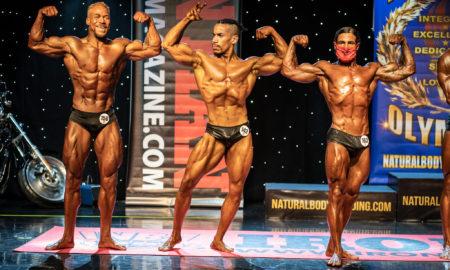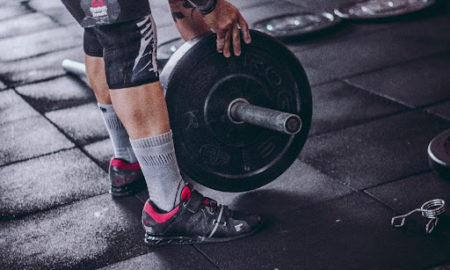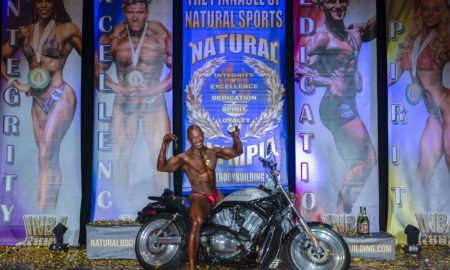As the current IFBB Mr. Austria, Tony Breznik may just have what it takes to make big waves in the world of pro bodybuilding. The former high school ice hockey player was plagued by athletic injuries, which caused his switch to bodybuilding, a decision that turned out to have been a good one for this gifted athlete. Between ages 21 and 23 Tony packed on 40 pounds of pure muscle, which won him his title.
So take a seat and buckle up. We’re taking a jet trip into Tony’s world.
DY: Basics first. What’s your height and what was your competition weight?
TB: My height is 176 centimeters—about 5’9”—and my present weight is 114 kilograms—250 pounds or so. My competition weight is 235 pounds.
DY: What was your most prominent win?
TB: The IFBB Austrian Championships in 2008.
DY: What was your most recent competition?
TB: The IFBB European Championships in 2008.
DY: Congratulations on making it to that level! How did that feel?
TB: Well, it felt good, and I saw what I could achieve with hard work and hard training and a well-designed eating plan.
DY: Was that the best condition you’ve achieved to date?
TB: Until today, yes. But I’m still young, and my condition keeps getting better from year to year. The great support I’m getting from Ultimate Nutrition will help me be even better for the next show. It’s important to have good sponsorship so I can focus on my training.
DY: Would you say that the real competition was with yourself more than onstage with the other competitors?
TB: Yes. Sometimes it’s hard to have the discipline, but it’s like a job, and I love this job. Onstage it’s different because there I get the wage for my hard training and discipline.
Overall, it’s a great feeling to be the best competitor in my own country. Now I have the self-confidence to achieve higher goals. Soon you’ll see me on the Olympia stage, I hope!
DY: Let’s get a little history. What sports did you play when you were growing up?
TB: I was born on September 22, 1984, as the second child of my parents. From an early age my father took me to watch the games of our local ice hockey team.
DY: Did you love it?
TB: Yes, right from the beginning I realized that I love this crackdown but especially fast and tactical game, so I started my athletic career as an ice hockey player at the tender age of five years. I got nominated for the boys’ championships in Innsbruck, Austria. There I was awarded as youngest player.
DY: How did that influence you?
TB: Sports have always been a major part of my life, and so I integrated it in my future plans. After graduating from compulsory school, the question was raised, What now? I had to find a way that offers both physical and mental training. So the answer was the SSLK [a model school that emphasizes sports training as well as general education, located in the province of Carinthia].
DY: Did you go there to train?
TB: Yes, absolutely, at the age of 14 years I left my parents’ house and moved to Villach. After some initial problems in combining the school and the sport, I learned to organize my time better.
After only one year in Villach, I got nominated for the Austrian U16 [under 16 years] ice hockey national team. Together with the national team I joined a 10-day tournament in Edmonton, Canada, where we finished in fourth place. Of my award as player of the day, I am proud to this day.
My first hockey season in Villach ended with second place and my first championship medals.
DY: That must have been very gratifying. What caused you to leave ice hockey behind?
TB: The last years of my ice hockey career were accompanied by violations. At the age of 15, I was plagued by growth disorders, especially Scheuermann’s disease. I came to grips with this [spinal] problem with the help of therapies and medical care over months.
I realized that my ice hockey career might come to an abrupt end. Supported by chi gong and weightlifting, I continued to play ice hockey until I got called for military service. In 2004 I stopped playing ice hockey because of ongoing meniscus problems.
DY: Where did bodybuilding come in?
TB: After a short regeneration period I forced all my energies into weightlifting, where I had already found self-affirmation during my ice hockey career.
At the age of 19, I first attended—and won—the Styrian bench press championship. With a bodyweight of 195 pounds I set a new record at 407 pounds. During this contest I was discovered by Mr. Stueckler Walter, the vice president of the Austrian weightlifting and bodybuilding association. He reinforced my ambition for the sport of bodybuilding.
After one year of preparation I entered my first bodybuilding contest, sponsored by Ultimate Nutrition. I entered with a weight of 201 pounds and won the junior class.
There I first met the eight-time Mr. Olympia, Ronnie Coleman.
DY: So that was the beginning of your bodybuilding career?
TB: Yes, only one week later, on April 23, 2005, I won the Austrian junior championship in Vienna. Some days later I got contacted by IFBB Austria.
In November 2005 in Wels, Austria, I once again finished in first place in a bodybuilding contest. After that I stopped competing until 2008 to increase my weight and muscle mass. In 2007 part of my preparation was a three-month residence in Los Angeles.
In September 2008 I returned to the stage at the Austrian Championships. I handled that challenge and won my weight class and also got first in the overall. At that contest I qualified for the European Championships.
DY: How did you meet the challenges that you faced in getting ready for your 2008 competitions?
TB: Fortunately, I have a lot of support from my family and friends. But the most important support I get is from Ultimate Nutrition. They provide me with the necessary nutritional supplements to achieve my goals.
DY: How did you design your nutrition program?
TB: I interact with other Team Ultimate Nutrition members like IFBB pros Markus Ruhl and Ed Van Amsterdam to discuss nutrition programs. They’ve both given me some guidance that’s really helped. I learned that it’s not just about calories in and calories out or how many grams of protein you take in. If I’m going to be competitive, supplement timing, bioavailability and specialized products must all come into play. Certain chemical nutrients can help turn off the body’s “fat-building microchip,” and yet others can turn on the body’s “muscle-building microchip.” Ed and Marcus have helped me understand that process.
DY: Can you give us a sample day meal-by-meal?
TB: Sure.
Breakfast
200 grams oatmeal
2 scoops Iso Mass Xtreme Gainer
300 milliliters egg whites
150 grams chicken breast
Midmorning
250 grams fish
90 grams brown rice
Lunch
200 grams steak
2 large baked potatoes
Midafternoon shake
2 scoops carbo booster
1 scoop Iso Sensation 93
Workout
AdreNOline during training
Postworkout shake
1 scoop Iso-Mass
10 grams glutamine
10 grams creatine
Dinner
250 grams chicken breast
80 grams brown rice
Vegetables
Evening
200 grams fish
Vegetables
Before-bed shake
2 scoops Iso Sensation 93
1 banana
DY: Which nutritional products do you find useful?
TB: There are a lot of important nutritional products, but I love the products of Ultimate Nutrition because of their high quality. For example: Muscle Juice Revolution 2600, Iso Mass Xtreme Gainer, AdreNOline and Red Zone. They gave me some prototypes of their new Iso Mass Xtreme Bar, and it’s awesome too.
DY: Do you have a training partner, and is he an important part of the preparation process?
TB: My training partner is Andi Geisi, and, yes, he is a very important part of the preparation process. He helps me go to the limit in our workouts. He’s a good motivator.
DY: How would you describe your training style? Has it changed much over the past few years?
TB: It’s important to try different and new exercises from time to time. That’s why I often go to the U.S.—because there I can try other gym equipment and I have the chance to exchange experiences with other bodybuilders.
DY: Which bodyparts respond easily for you, and which have been more challenging?
TB: My legs respond easily. My back has been more challenging.
DY: What are your favorite exercises? Are there any that you’re unusually strong on?
TB: My favorite exercises are squats and situps. I also like to bench-press. I am unusually strong on squats and leg presses.
DY: Please break down a typical week of your training program, bodypart by bodypart.
TB: No problem.
Monday: Chest and Biceps
Incline flyes 4 x 12
Bench presses 4 x 12-15
Incline dumbbell presses 4 x 12-15
Cable crossovers 4 x 30-40
Incline curls 4 x 12-15
Standing barbell curls 4 x 12-15
One-arm high cable curls 4 x 30-40
Thursday: Back and Triceps
Straight-arm pulldowns 4 x 12-15
Bent-over barbell rows 3 x 12-15
Wide-grip pulldowns 8 x 15-20
Dumbbell kickbacks 4 x 12-15
Overhead rope extensions 4 x 12-15
Close-grip bench presses 6 x 15-20
Wednesday: Cardio
Thursday: Legs
Superset
Leg extensions 4 x 20
Leg curls 4 x 20
Leg presses 5 x 20
Squats 5 x 12-15
Seated calf raises 8 x 20-30
Leg press calf raises 10 x 20-30
Friday: Shoulders
Superset
Front raises 5 x 20
Lateral raises 5 x 20
Seated dumbbell presses 4 x 20
Dumbbell shrugs 5 x 15-20
Smith-machine shrugs 5 x 15-20
Saturday: Biceps and Triceps
Superset pump training x 30 minutes
Sunday: Off
DY: What improvements did you make during your break from competition?
TB: I was able to improve my calves, upper chest and biceps.
DY: Who has inspired you in your fitness career?
TB: Markus Ruhl.
DY: What kind of mistakes did you make early on with your training and nutrition, and how did you make changes to end up with the program you use today?
TB: Fortunately, I did not make big mistakes with my training and nutrition. My friend Daniel analyzed my body and my condition at regular intervals and adapted my training and nutrition from time to time.
DY: At what point in your life did you realize that fitness was what you wanted to do?
TB: A bad knee injury stopped my hockey career. In the rehabilitation program I found out that I have good genetic endowments. I loved the hard training. I came to the decision to end my hockey career and concentrate on bodybuilding.
DY: Who, past and present, exemplifies the type of physique you consider ideal?
TB: As I mentioned, my idol is Markus Ruhl. In the last decades there was a lot of change in the bodybuilding sector. From my point of view it’s most important to harmonize body and soul and to be charismatic. There are a lot of good bodybuilders at present.
DY: What have been your biggest challenges in life and in your bodybuilding career? How did you overcome them?
TB: I reached a crossroad in my life when I stopped my hockey career and decided to concentrate on bodybuilding. At the beginning I was not sure that this was the right decision. But after my first success in the junior championships, I knew I was on the right track. It is fundamental to have a positive attitude and to be patient to overcome challenges.
DY: What’s next for you in terms of competition?
TB: I want to participate in international competitions, and I hope that my name will become known throughout the international bodybuilding scene in future.
Editor’s note: To contact Tony for guest appearances or to get help designing your own nutritional plan, go to www.UltimateNutrition.com. IM
















You must be logged in to post a comment Login